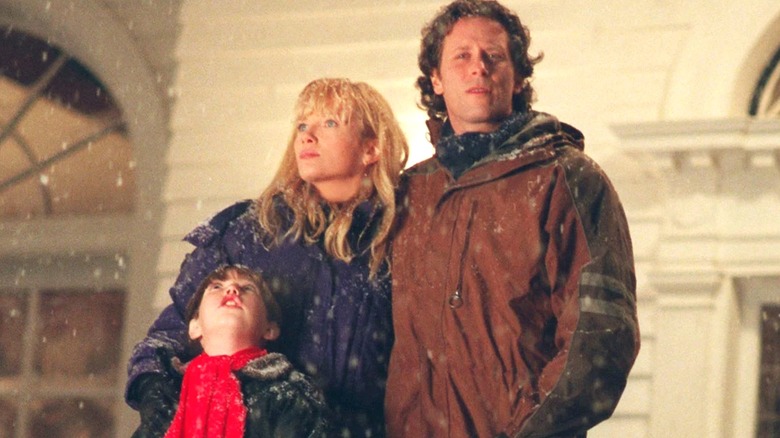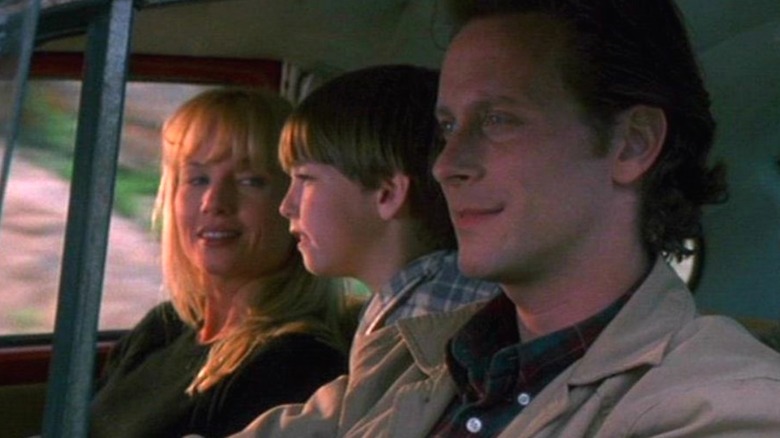Stephen King's Disdain For Kubrick's The Shining Made Him Produce This Horror Miniseries
It is no secret that Stephen King hated Stanley Kubrick's adaptation of his bestselling horror novel, "The Shining." The reasons are multi-pronged, ranging from strong disapproval over Jack Nicholson's casting as Jack Torrance to disappointment over substantial changes from the original book. These criticisms, while valid, clash with the film's undisputed status as a horror classic. The celebrated status of "The Shining" adds a bitter sting to King's perception of it; he called the "maddening, perverse, and disappointing" adaptation "a big, beautiful Cadillac with no engine inside it" (via Deadline).
Now, these are really harsh words, as King essentially likens Kubrick's rendition of "The Shining" to an exercise in style over substance, and accuses him of warping the book's artistic intent for the worse. Irrespective of whether you agree with King, it is true that Kubrick's story significantly diverges from the source material, to the extent that both Jack and Wendy Torrance are reinterpreted as markedly different characters. Moreover, King's story feels like a more nuanced tragedy, as his Jack Torrance is an everyman who is driven mad by a terrible purpose only after he sets foot inside the Overlook Hotel. By contrast, Nicholson's Jack always seems a bit off, a bit too intense, even before the hotel claims his soul.
In 1997, King decided to write and produce a three-episode television miniseries that was faithful to his novel, dubbing it "Stephen King's The Shining." Mick Garris (who previously helmed 1992's "Sleepwalkers," also written by King himself) directed these episodes, imbuing a classic story with commendable (albeit flawed) flourishes. Some would even argue that King's miniseries is worth watching alongside Kubrick's 1980 film, as these dual interpretations greatly enrich our understanding of the strange, intriguing world of the Overlook Hotel.
Stephen King's The Shining miniseries deserves more credit than you think
It goes without saying that Garris' miniseries doesn't come close to the brilliance of Kubrick's adaptation, but this knee-jerk comparison shouldn't be the only metric for evaluating the show. We have to remember that King's reaction to the 1980 film wasn't an attempt to appear contrarian for the sake of it — if anything, it is bittersweet evidence of dashed expectations. King had sincerely hoped that Kubrick would understand (and preserve) the thematic impulses that drive his tragic horror story. In a 1983 interview with Playboy (via Dissolve), King expressed his general admiration for the director, but opined that Kubrick's cold pragmatism proved to be an obstacle to the instinctual, emotions-first realm of horror: "A visceral skeptic such as Kubrick just couldn't grasp the sheer inhuman evil of the Overlook Hotel."
King and Garris' "The Shining" is supposed to be the antithesis to this cold, pragmatic outlook — and it very much is. The show opens by exploring the inner lives of Jack (Steven Weber), Wendy (Rebecca De Mornay), and their son Danny (Courtland Mead), bringing every eccentric little detail from the book to life (including a rather unfortunate-looking manifestation of Danny's imaginary friend Tony). Some sequences are whimsical to the point of silly excess — such as when CGI hedge animals come to life and chase Danny around the hotel's grounds, or when an unhinged Jack yells "Boo!" before hacking viciously at the bathroom door — but there's a sincere charm to this literal approach. Plus, we need to acknowledge the fact that Garris expertly frames some of the more overlooked sections of the story, bringing them to life with great care.
On the flipside, such a literal, unsubtle retelling does little to evoke the anxiety you feel when you read about the Overlook and its corrosive evil for the first time. Granted, this version of "The Shining" radiates warmth, fleshing out the abstract terror of being hounded by a vengeful hotel and its dead, maniacal inhabitants. But the same coldness that King criticizes Kubrick for is what makes the latter's perspective so dreary and haunting. There's bleak desolation in Kubrick's vision, where the more outlandish aspects of the tale are conveyed through symbolic insinuation alone, making these aspects more believable than ever.
While King's miniseries is imbued with glimmers of a competent tale that remains faithful to the author's vision, it achieves little else. Nevertheless, it is a valuable effort that should be evaluated on its own terms. Go on, give it a fair chance.

